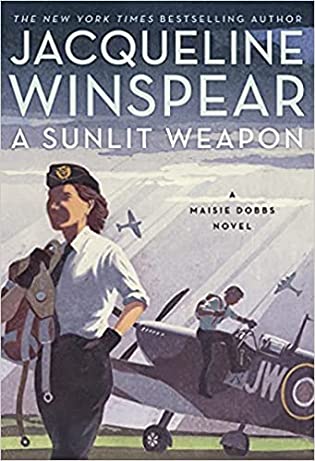 A Sunlit Weapon (Maisie Dobbs #17) by Jacqueline Winspear
A Sunlit Weapon (Maisie Dobbs #17) by Jacqueline Winspear Format: eARC
Source: supplied by publisher via Edelweiss
Formats available: hardcover, paperback, large print, ebook, audiobook
Genres: historical fiction, historical mystery, World War II
Series: Maisie Dobbs #17
Pages: 358
Published by Harper on March 22, 2022
Purchasing Info: Author's Website, Publisher's Website, Amazon, Barnes & Noble, Kobo, Bookshop.org, Better World Books
Goodreads
In the latest installment of the New York Times bestselling series, a series of possible attacks on British pilots leads Jacqueline Winspear's beloved heroine Maisie Dobbs into a mystery involving First Lady Eleanor Roosevelt.
October 1942. Jo Hardy, a 22-year-old ferry pilot, is delivering a Supermarine Spitfire--the fastest fighter aircraft in the world--to Biggin Hill Aerodrome, when she realizes someone is shooting at her aircraft from the ground. Returning to the location on foot, she finds an American serviceman in a barn, bound and gagged. She rescues the man, who is handed over to the American military police; it quickly emerges that he is considered a suspect in the disappearance of a fellow soldier who is missing.
Tragedy strikes two days later, when another ferry pilot crashes in the same area where Jo's plane was attacked. At the suggestion of one of her colleagues, Jo seeks the help of psychologist and investigator Maisie Dobbs. Meanwhile, Maisie's husband, a high-ranking political attach� based at the American embassy, is in the thick of ensuring security is tight for the first lady of the United States, Eleanor Roosevelt, during her visit to the Britain. There's already evidence that German agents have been circling: the wife of a president represents a high value target. Mrs. Roosevelt is clearly in danger, and there may well be a direct connection to the death of the woman ferry pilot and the recent activities of two American servicemen.
To guarantee the safety of the First Lady--and of the soldier being held in police custody--Maisie must uncover that connection. At the same time, she faces difficulties of an entirely different nature with her young daughter, Anna, who is experiencing wartime struggles of her own.
My Review:
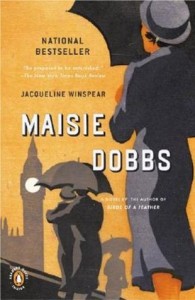 I love the Maisie Dobbs series, so I had been saving this book for a time when I needed a reading treat. As yesterday was Memorial Day, I was looking for a book about war and what comes after. Considering the origins of Memorial Day, I probably should have been looking for a book set during the U.S. Civil War, but I remembered I’d been saving this one and today seemed like a perfect time. So here we are.
I love the Maisie Dobbs series, so I had been saving this book for a time when I needed a reading treat. As yesterday was Memorial Day, I was looking for a book about war and what comes after. Considering the origins of Memorial Day, I probably should have been looking for a book set during the U.S. Civil War, but I remembered I’d been saving this one and today seemed like a perfect time. So here we are.
Part of what makes this series so compelling is the way that Maisie Dobbs as an investigator turns some of the mystery conventions on their pointy little heads. A lot of fictional detectives don’t believe in coincidence, so when there are multiple crimes it usually turns out that there’s a single cause or perpetrator at their roots.
Maisie, as trained by the late and often lamented Maurice Blanche, sees coincidences as guideposts – not necessarily to the crime she’s investigating, but to something in her own life that needs looking into. Which means that in addition to the usual questioning of witnesses and suspects, Maisie is quite often questioning herself. Not that she doubts herself, but that she’s always looking for the lesson that the universe is trying to teach her.
The cases and incidents that she undertakes to resolve in A Sunlit Weapon have huge, potentially world-shattering consequences. They will also change the life of one little girl. And all the aspects of that tangled investigation are wrapped around war. Not just this war, but also the one before. And not just the fighting, but the grief that inevitably follows in its wake.
Maisie begins with one case. A young aviatrix, a member of the Air Transport Auxiliary tasked with repositioning planes from one airbase to another, is nearly shot down over Kent by someone on the ground. When Jo Hardy goes back to check out the scene on the ground, she finds, not the shooter, but Mattias Crittenden, a young black American soldier bound and gagged in a deserted barn. She is determined to make sure that the black GI gets justice and not a lynching, so she turns to Maisie for help.
Maisie also has a much more personal case of her own. Her adopted daughter Anna is being bullied at school because Anna is slightly darker skinned than the typical “English Rose” complexion. The children at her school have suddenly started harassing her and referring to her as an enemy Italian, when in fact she’s English. (Her father was a Maltese sailor. Malta became part of the British Empire in 1814.)
What has Maisie perplexed is that Anna was happy in school and eager to learn – up until the past few weeks. Something at the school has changed – and not for the better.
These two “cases” shouldn’t have anything to do with each other. Or to the third case that falls into Maisie’s lap. Her new husband, Mark Scott, is an American attached to the U.S. Embassy. His current task is to handle security for Eleanor Roosevelt’s imminent visit to Britain. Scott has learned that there are plans to assassinate the First Lady while she’s in Britain.
Maisie’s search of the barn where Private Crittenden was discovered turned up two items. The dog tags of Crittenden’s friend Private Stone, who is missing – and coded plans that reference the First Lady’s codename while she’s traveling.
Somehow, Jo Hardy’s mysterious ground shooter and the plot to assassinate Mrs. Roosevelt are linked – even if Maisie doesn’t yet know how. And all of it, along with the mystery at little Anna’s school, may not all be part of the same series of crimes, but are all part of the same thing – the terrible consequences of war.
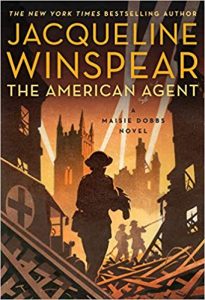 Escape Rating A-: We’ve followed Maisie from her childhood apprenticeship with Maurice Blanche through her nursing service in WW1, through her grief at the loss of her fiancé, her eventual wedding and subsequent tragic widowhood, her recovery and now her second marriage to the American Mark Scott who she met in a previous book in this series, The American Agent. What we haven’t seen until now is Maisie as a married woman, as the period in her life when she was married happened between Leaving Everything Most Loved and A Dangerous Place. So for those of us who have followed Maisie through her career, this is the first time we’ve seen her in the position where she’s going to have to negotiate how to balance her work life and personal life in a way that she hasn’t had to before.
Escape Rating A-: We’ve followed Maisie from her childhood apprenticeship with Maurice Blanche through her nursing service in WW1, through her grief at the loss of her fiancé, her eventual wedding and subsequent tragic widowhood, her recovery and now her second marriage to the American Mark Scott who she met in a previous book in this series, The American Agent. What we haven’t seen until now is Maisie as a married woman, as the period in her life when she was married happened between Leaving Everything Most Loved and A Dangerous Place. So for those of us who have followed Maisie through her career, this is the first time we’ve seen her in the position where she’s going to have to negotiate how to balance her work life and personal life in a way that she hasn’t had to before.
Because being an investigator is very much core to who Maisie is as a person. It wasn’t easy giving it up to marry the first time around, but she was younger and less well established. At this point in her life she knows she can’t give up being who she is to become a traditional wife and mother – something that the Headmistress of her daughter’s school throws in her face in their first confrontation.
At the same time, a part of the undercurrent of this story is that Maisie’s job is dangerous, and that no matter what she promises she’s not going to stop doing it. And that her new husband hates the danger she throws herself into – even though that kind of danger is the reason they met in the first place.
But the case, or rather cases, that Maisie looks into exemplify the way that Maisie works. She pulls on one thread because it’s part of her initial remit from her client. The more she pulls, the more she investigates, the more complicated and interwoven the threads seem to be – until they send out branches and tentacles into people and places she never thought they’d go.
It’s not a quick process, so Maisie’s stories aren’t page-turners in a thriller sense. And yet they’re compelling because Maisie makes them so. She’s intelligent and complicated, and the way she works through her cases is the same – no matter where they lead her.
In this case they lead her from a black GI accused of killing his white friend even though no corpse has been found. It’s all too clear that this is a rush to judgment or that he’s a convenient scapegoat because of the color of his skin. There is no part of the way that the US military treats its black soldiers, particularly in the persons of its MPs, that does not grate – not just on 21st century readers but on the British public at large at the time. Because racial segregation doesn’t make sense and that’s all too easy to see through the eyes of people who don’t employ it. (That’s not to say that Britain didn’t and doesn’t have plenty of its own problems in regards to class separation, elitism, etc., just that it didn’t run that way at the time.)
But in doing her best to ensure that Pvt. Crittenden isn’t rushed to a hangman’s noose or the electric chair for the murder of a man who might not even be dead Maisie opens up more cans of worms. As she does.
And in the middle of investigating how Crittenden got to be in that barn – no matter how many roadblocks, literal and figurative, get thrown in her way – Maisie links the barn to the shooting, the shooting to a damaged young man, and the young man all the way back to the Headmistress of her daughter’s school. Not because they have the same beliefs or commit any of the same actions, but because they were all, every single one, damaged by the war that was supposed to have ended all wars.
Not because it didn’t, but because war is hell – both for the ones who fight it and the ones who wait behind.
I am already looking forward to Maisie’s next adventure, and not just because I’m wondering how hard (or if) she’s going to have to hit her husband with a clue-by-four to get it through his head that she’s never going to turn away from doing the right thing no matter how dangerous it might be. As this book took place in the autumn of 1943, I expect the next book to cover some of 1944. If Maisie ends up being involved in the planning of or the misdirection wrapped around D-Day I will not be at all surprised. Riveted, but not surprised. And I can’t wait to read it!






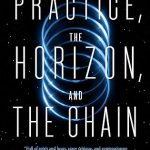


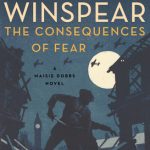
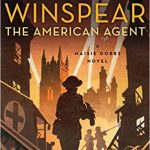
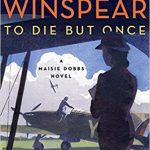
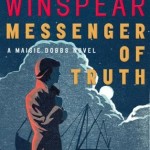









Great review. I am a huge fan of Maisie Dobbs. There is a short book out soon with Vignettes of Maisie’s family. https://www.amazon.co.uk/Maisie-Dobbs-Mysterious-Profile-Profiles-ebook/dp/B09W4LY197/ref=mp_s_a_1_2?crid=1RPE32XHL87B1&keywords=jacqueline+winspear&qid=1654004877&sprefix=Jacqueline+%2Caps%2C187&sr=8-2
Thanks for the tip. Amazon pre-orders here I come!
Marlene Harris recently posted..Review: A Sunlit Weapon by Jacqueline Winspear